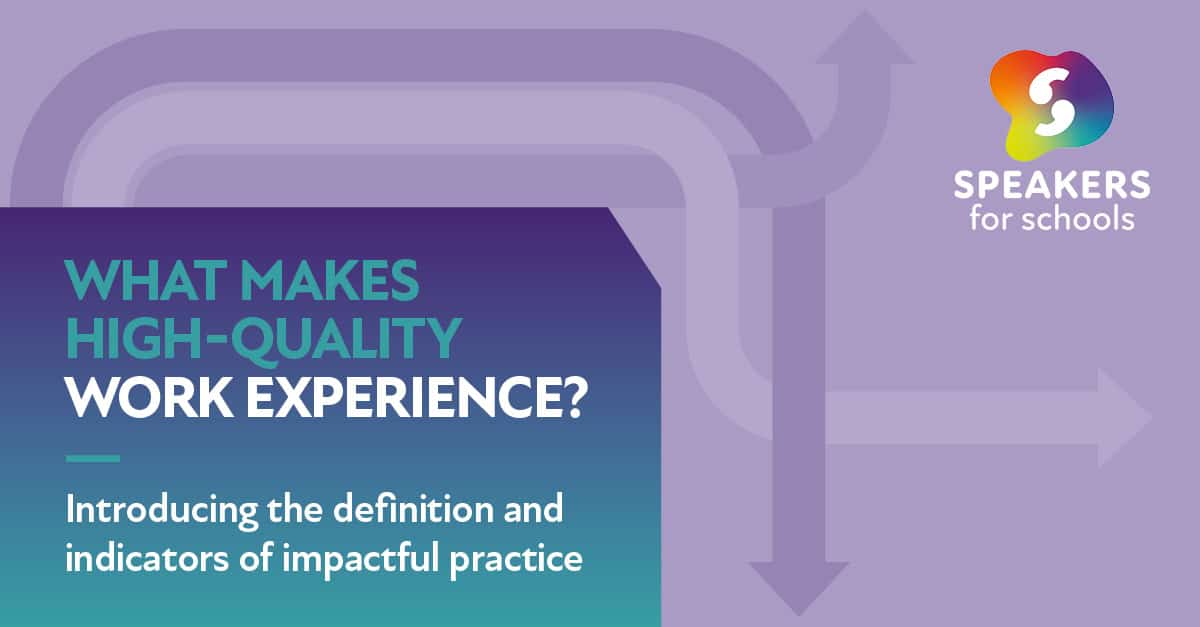What makes high-quality work experience? Introducing the definition and indicators of impactful practice
- Jun 12, 2025
- 2 min read
Updated: Nov 27, 2025
What makes high-quality work experience? Introducing the definition and indicators of impactful practice

Speakers for Schools Launches a New Framework for High-Quality, Impact-Driven Work Experience
Speakers for Schools is proud to launch its latest research, setting out a clear, evidence-based framework for delivering high-quality work experience that is purposeful, holistic, and designed to deliver lasting impact for young people.
Rooted in insights from employers and sector experts, this framework arrives at a pivotal moment. With the government’s commitment to offering all young people two weeks of work experience by age 16, it’s more important than ever to prioritise quality alongside scale. Work experience must be more than just a placement – it should be aim-driven, thoughtfully structured, and strategically aligned with both young people’s development and employers’ future workforce needs.
Our new framework centres on four interconnected pillars: Envision, Implement, Reflect, and Post-Work Experience Pathways. Together, they guide employers in designing experiences that are coherent, inclusive, and genuinely transformative.
Envision: Setting Intentions and Building Foundations
This stage focuses on planning and purposeful design to maximise relevance and engagement.
Purpose: Clearly defined aims that align with employer talent strategies and guide programme design.
Connect: Strong partnerships with schools, young people, and stakeholders to ensure inclusive recruitment and engagement.
Safe and Inclusive Practice: Proactive safeguarding and barrier removal to create accessible, supportive environments for all participants.
Implement: Delivering with Intent
The delivery phase ensures interactive, structured experiences that reflect both the goals of young people and employers.
Learning Outcomes: Defined learning goals guide the content and help young people articulate their growth.
Structure: Flexibly designed programmes that meet defined aims while responding to participants’ needs.
Interactivity: Frequent, meaningful engagement with professionals builds confidence and broadens horizons.
Reflect: Embedding Learning and Driving Improvement
Reflection is critical for young people to internalise learning and for employers to refine future delivery.
Reflection: Structured time for participants to process experiences and plan next steps.
Recognition: Formal and informal feedback to celebrate achievements and reinforce workplace behaviours.
Impact: Evaluation mechanisms to capture outcomes and drive continuous improvement.
Post-Work Experience Pathways: Sustaining Impact
Ongoing support is key to ensuring that work experience leads to meaningful outcomes.
Short-term (0–3 months): Personalised follow-ups and alumni engagement to reinforce learning.
Medium-term (3–12 months): Mentoring, skills resources, and career pathway signposting.
Long-term (1+ year): Continued engagement through alumni talent pools and return opportunities.
This framework serves as a practical and strategic tool for employers looking to deliver experiences that genuinely support young people’s transition into the world of work. It also provides valuable insights for policymakers working to embed quality standards in national work experience initiatives.
To read the full report and explore the framework in more detail, please click here: https://www.futuresforall.org/_files/ugd/1b2a28_b7a975536ff04b62bf5086aa5a1e161f.pdf



